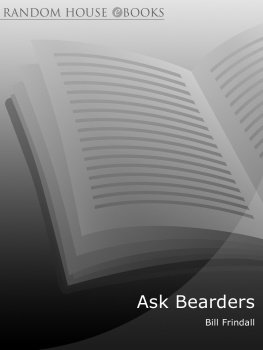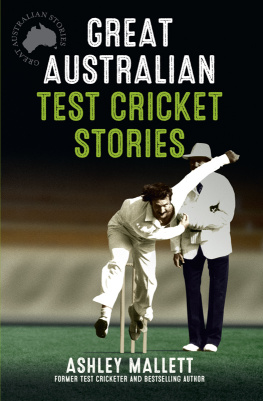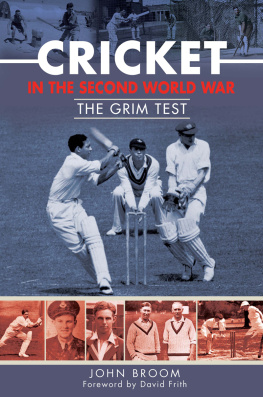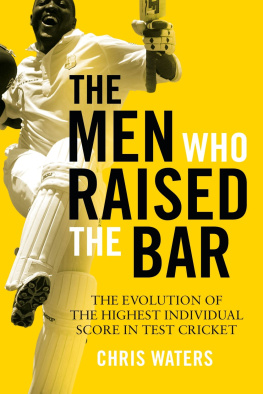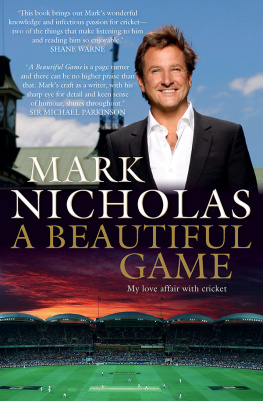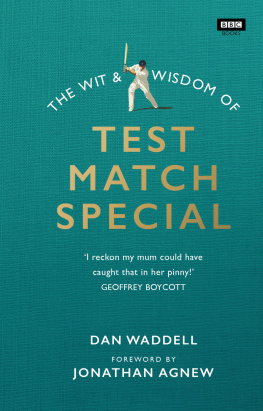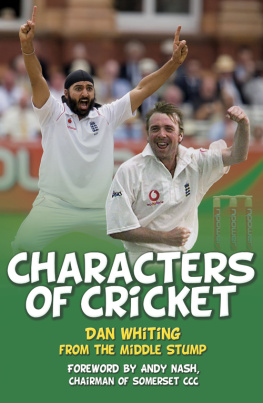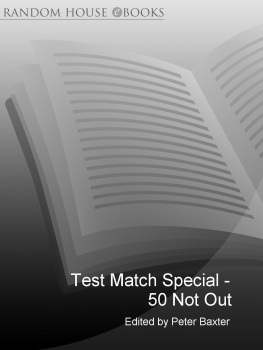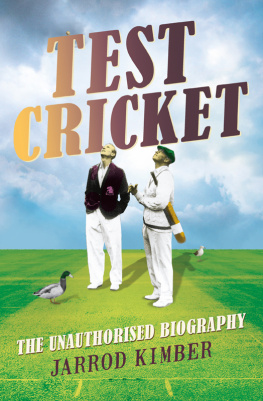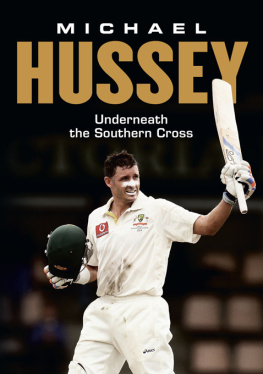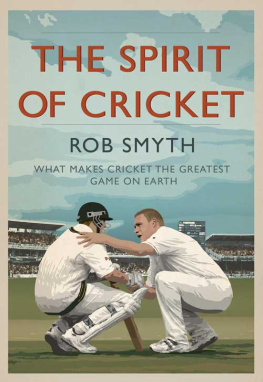Contents
About the Book
No one knew, and loved, cricket quite like Bill Frindall his passion and knowledge of the game was evident as soon as he took over scoring for Test Match Special in 1966, a post he held until his death in 2009. In 2001, he began offering his cricket expertise through a column on the Test Match Special website, Ask Bearders. Fans would write in with the most difficult and arcane questions possible, hoping to Stump the Bearded Wonder. They never did.
Ask Bearders collects the best of the Q & As from Bills popular column, offering cricket fans a one-stop compendium of the most challenging bits of history and statistics the game has to offer. It is a unique testament to the perfection Bill sought in his study of the game, and an essential book for any serious cricket fan.
About the Author
BILL FRINDALL was born in Epsom, Surrey, on the first day of the Timeless Test at Durban. Dubbed The Bearded Wonder by the late Brian Johnston, Frindall was the longest serving member of Radio 4s Test Match Special commentary team. Making his debut in 1966, he scored 377 Test matches, including all 246 played in England. He was appointed an MBE in 2004 for his services to cricket and to broadcasting, and was the editor of Playfair Cricket Annual for 23 years, from 1986 until his death in January 2009.
Foreword
This delightful book was not intended to be a tribute to Bill Frindalls life merely to his work. The fact is, however, that Bills character and humour leaps out at you from every page and from each of his replies to the sorts of questions that I tormented him with for 18 years. Mind you, I was not always guaranteed to receive an answer, apart from some muttering deep into his beard and a deliberately fixed focus on the cricket straight ahead!
Testing Bills vast memory and quite staggering capacity to research even the most apparently mundane statistic was one of my most enjoyable pastimes on Test Match Special. Some questions might be purely mischievous when the passage of play was dull, perhaps but usually it was a serious enquiry brought about by the fascination of every aspect of this wonderful game that we all share. Bills particular love, of course, was statistics something that never gripped me in quite the same way even when I was playing. But like many of our listeners, I found myself increasingly interested in crickets facts and figures because of Bills natural ability to present them entertainingly and give them context. Indeed, Bills greatest skill was to put fun into the apparently mundane role of scoring.
Brian Johnston christened him the Bearded Wonder because Bill was able to produce answers to the commentators questions even while he was scoring a test match in the minutest detail. Bills good-natured nemesis, Steve Pittard from Huish Episcopi, is often first off the mark with the correct answer via email, but Bills primary role, after all, was to produce a record so precise and detailed that he could tell me, hours later, to which part of the ground Kevin Pietersens third four of the day was struck. This was due to his scoring system a bewildering mass of squiggles and hieroglyphics that I never understood after all these years which was the real reason for Bills notoriety as a statistician, and the fascination of the listeners in him.
Visitors to the Test Match Special commentary box had one thing in common in that they all wanted to watch Bill in action. Sitting at the front table surrounded apparently chaotically by watches, sheets of paper, pens of different colour and type, at least one laptop and a mountain of files, Bill commanded a corner. It really was his territory and woe betide any unfortunate commentator who trespassed into it even when hosting a crowded on-air discussion during an interval when Bill was not actually in the box! His return would be accompanied by a series of snorts and harrumphs and, if that did not do the trick, ones chair would then receive a firm shove in the back regardless of whether you were actually talking at the time or not. Visitors, however, were always welcomed very warmly into Bills corner, and many of our celebrity guests taking A View from the Boundary on Saturday lunchtime would spend much of the day sitting alongside Bill.
It is clear that we have lost much more than merely a great scorer. Bill really was the cornerstone of Test Match Special and one of the true characters of our quirky soap opera. To work alongside him was a great privilege as well as enormous fun, and just as top cricketers provide inspiration for future generations, one glance at this collection of questions from his loyal listeners all over the world demonstrates the legacy of Bill Frindall without doubt, crickets finest statistician.
Jonathan Agnew
Introduction
The inevitable problem with this snapshot of Bill Frindalls vast cricketing knowledge is that were he still alive hed have done the thing so much better. As a prolific cricket writer and broadcaster, his attention to detail, command of statistics and fierce enthusiasm for the craft of scoring were legendary within the game. Given the task of editing this book, he would have had a hundred entries selected, indexed and cross-referenced by lunch on the first day. Sadly, fate robbed us of one of crickets great characters on 30 January 2009 and, for the first time in 246 home tests an Ashes year to boot listeners to the BBCs Test Match Special are without the voice of the Bearded Wonder. For two, perhaps three, generations of fans, English summers can never be the same again.
This is not a book about Bills personal story his own autobiography, Bearders: My Life in Cricket, is the place for that. Suffice to say that his vital career statistics are as follows. He was born William Howard Frindall in Epsom, Surrey, on 3 March 1939 the first day of the famous South Africa-England Timeless Test (which lasted so long the English tourists were in danger of missing their boat home). After leaving Reigate Grammar School, he studied architecture before a spell of national service led to what he later described as six-and-a-half seasons for the RAF. Throughout this period he played club cricket wherever and whenever he could; bowling fast and, as one commentator would later laconically observe, optimistically.
His big break came in 1965 when, noting the death of the first TMS scorer Arthur Wrigley, he wrote to the BBC applying for the job. Duly appointed, he scored his first Test match at Old Trafford on 2 June 1966 (when England entertained the West Indies) and never missed a home Test thereafter. Throughout his BBC career he relished any opportunity to explain how he got started and would solemnly advise would-be scorers to keep an eye on the obituary columns.
Black humour was undoubtedly one of his great joys, but it was with genuine delight that he later advised Wrigleys son Steve about the value of Arthurs cricket memorabilia. After dispensing some sales tips, Bill recalled how he applied for [Arthurs] job and began the next summer on a three-match trial and was found not guilty!
As the 1960s rolled on, so Frindalls broadcasting reputation grew, largely through banter with the likes of fellow commentators Brian Johnston and John Arlott. Later he played the curmudgeon to BBC cricket correspondent Jonathan Agnew, who would delight in teasing him about the state of his beard or occasional dogged stubbornness on cricketing terminology. With a guttural grunt, Frindall would verbally cuff his tormentors aside sometimes tapping the window to remind them of the job in hand.
Next page
